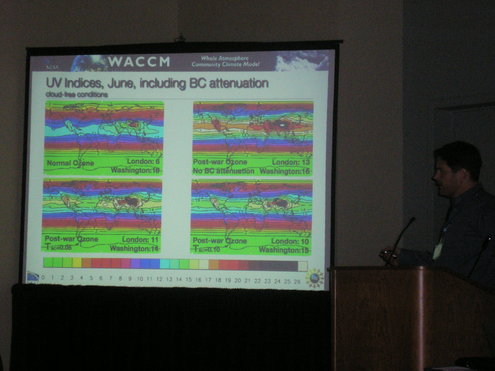
Hotting up: Michael Mills from the National Center for Atmospheric Research in Boulder, Colorado, shows how a nuclear war could affect the ozone
By Michael Banks in Washington, DC
“It’s a real bummer – quite depressing.” That is the summary of the first session I attended at the 2011 American Association for the Advancement of Science (AAAS) conference here in Washington, DC. Well at least according to Alan Robock from Rutgers University in New Jersey.
The session was about nuclear conflict and its effect on the climate, or more specifically what would happen to it if India and Pakistan had a nuclear war. Rather depressing stuff to hear at 8.30 a.m.
Luke Oman from NASA’s Goddard Space Flight Center studied what effects 100 nuclear bombs – each 15 kilotonne of TNT equivalent in explosive force – would have if detonated in the area. The number of bombs represents around 70% of the total number of warheads the two countries have.
Oman says such a concoction of explosions would create around 5 terragrams of black carbon – or soot – in the atmosphere. This would quickly rise towards the troposphere causing it to increase in temperature by around 30 degrees. The result of the soot would also lead to a global surface temperature drop of around 1.25 degrees and a 10% decrease in global precipitation.
All gloomy stuff, but the next speaker had even more bad news. Michael Mills from the National Center for Atmospheric Research in Boulder, Colorado, used similar models and found that around 30% of the ozone layer would be obliterated only two years after the event.
This would have untold consequences on ultraviolet (UV) levels all over the world. Indeed, Mills calculates UV radiation would increase so much so that in London the level would be around 13 (anything above 11 is considered extreme and with the recommendation to stay indoors) while Washington would be around level 16. This, Mills concluded, would all have a major effect on agriculture leading to a “nuclear famine”
A bummer indeed, and Robock summed up the ultimate aim of all this work. “We hope that people in this city will hear [the conclusions of these talks] and rid the world of nuclear weapons for good.”



